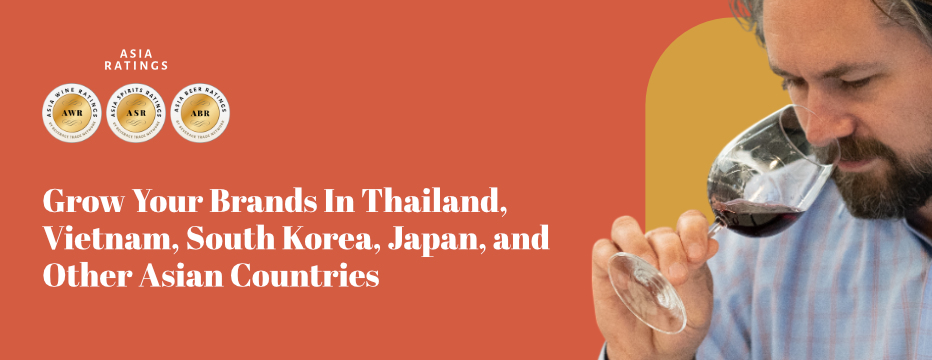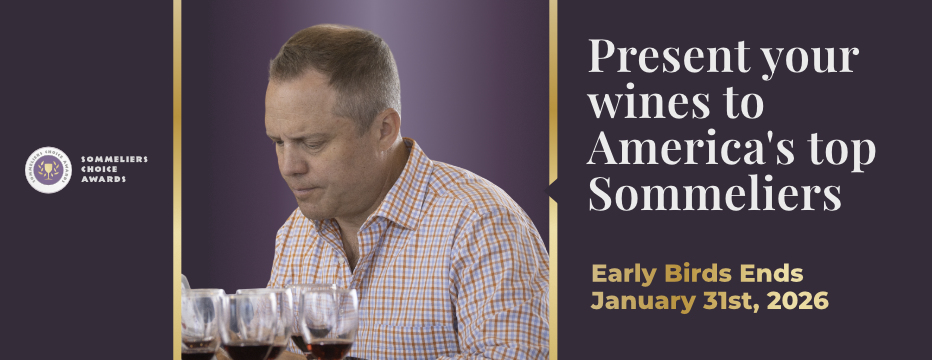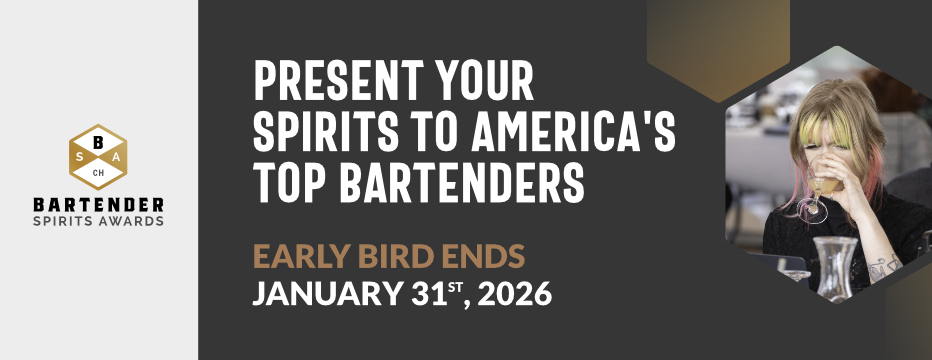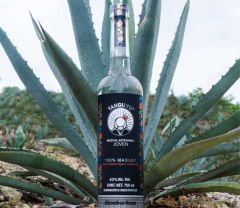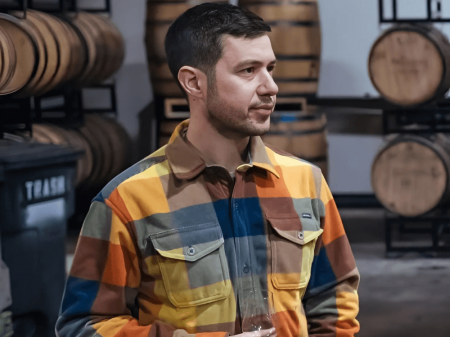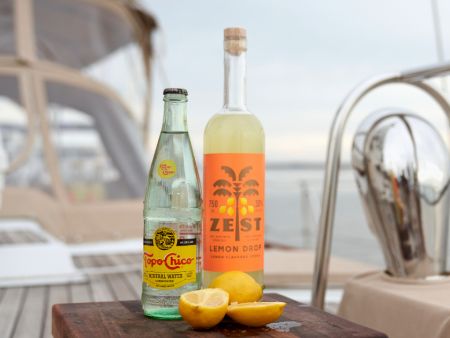Sommeliers Choice Awards 2025 Winners
Beyond Sparkling: How WineGB is Shaping the Future of British Wine
Nicola Bates on British wine’s biggest harvest and what comes next.
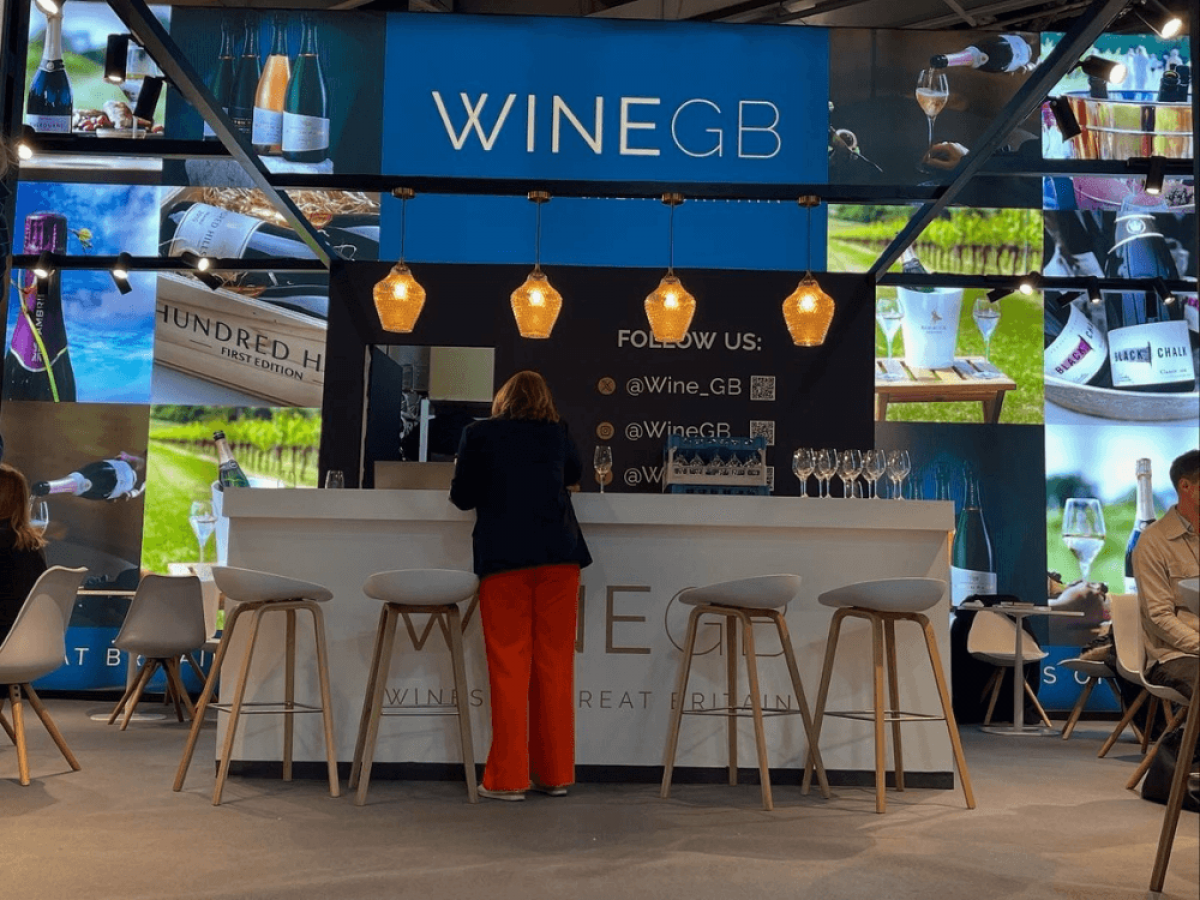
The British wine industry has reached a pivotal moment. With the largest harvest on record in 2023 and an expanding reputation on the global stage, the sector is moving beyond its roots in traditional method sparkling wine. Still wines—especially Chardonnay and reds—are gaining ground, exports are growing, and sustainability is taking center stage.
Nicola Bates, CEO of Wines of Great Britain (WineGB), stands at the helm of this transformation. Under her leadership, the organization is pushing for greater international visibility, refining its export strategy, and ensuring sustainability remains a core focus. In this conversation, Bates shares insights into how WineGB is positioning British wine for long-term success—balancing scale with quality, fostering a more diverse and inclusive industry, and making the most of a moment when British wine is firmly on the rise.
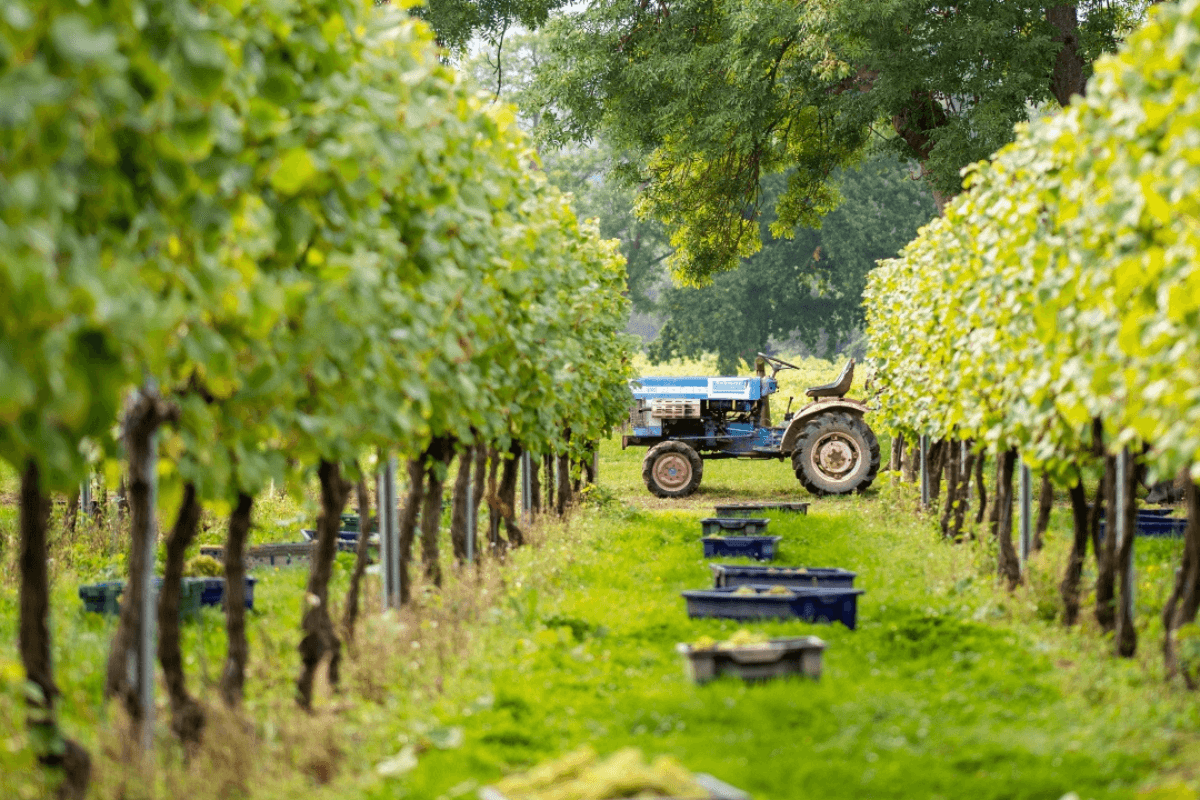
Image: A vineyard in the UK. Credit: WineGB
These are the key insights from the WineGB 2023 Harvest Report
1. Record-Breaking Harvest: 2023 was the largest-ever harvest for the UK wine industry, signaling significant growth and increased production capacity.
2. Export Potential: With growing production, British wine is well-positioned to expand into new international markets.
3. Diversification Beyond Sparkling: While traditional method sparkling wine remains dominant, still wines—particularly red and Chardonnay—are gaining prominence.
4. Climate & Sustainability: The warm growing season benefited yields, but long-term climate trends remain a focus.
Malvika: Nicola, I love your almost “all women” team. You’re poised to achieve great things!
Nicola: I think so. We're about to bring on a chap actually who's looking after our awards. So it's showing a bit more diversity. I've been thinking about why. It's always about balance, isn't it? It is really important actually that our team is able to reflect the needs of the sector. I've got a board which is 50-50, male, female. My chair is a woman. She has really led DEI in terms of the industry. And when I joined and made sure we restarted the group on people, we looked at things like safeguarding. within our sector, an incredibly important issue. When you're talking about alcohol, it's actually, what better sector you've leaned into it and thought, our teams are put into situations where they're engaged with customers in various ways. How do we best support them so they have the best experience and they are supported?
Malvika: This is a real issue in the industry. I discussed this with Queena Wong earlier, and how she brought the discussion out to the public via the survey. I think it's great that you've made it an agenda as well.
Nicola: So, I think that Queena has done a stellar job in saying, what's the landscape as it stands? And that survey was an important driver for us to carry out that work. Coupled with a legal change by the government that made it the duty of employers to ensure that their people are protected. So those two things happened at the same time. We wanted, as an industry body, to support our members, to support their teams, because that's what they want to do. And actually, there was very, very little information out there.
We were after the toolkit, which is in-depth, and useful. It's a pretty easy checklist, so people know what they need to do. If they need policies, they need to have advice, it's all captured in there, helping people to get to the endpoint much faster. And because it's so important, because it's about safety, we gifted that to the whole industry. And that, for me, I think that comes out of a team, a membership body, which understands the importance of proactivity and leadership.
Malvika: Let's talk more about what is happening in the British wine industry today.
The 2023 harvest was the biggest on record for British wine. How does this scale-up in production influence your export strategy, and which markets are most receptive to this increased supply?
Nicola: So the brilliant thing is now we have 11 million bottles which we are on average taking out. And there is then a consistency. We know full well that if we are in the market, we're able to then have the wines that follow through, which several years ago wasn't the case. So being able to go out and say we have the supply is important.
Looking at the comprehensive spending review, we are calling for the government to look at their review. So they're looking at how much money they spend as a government. and they spend a very, very small amount with us to promote us internationally. It’s better than nothing, but we can certainly improve on that particular position. So we've taken a case to them, talking about our top 10 market campaigns.
We are still very, very new. We do have good relationships. We were in the Commonwealth office a couple of weeks ago supporting them and showcasing our wines. But... there isn't, um, there's been a shift away in exports per se in sort of the category-wide marketing which in all other wine regions of the world you would expect to have. So there's an education job which, um, I think the government's interested in hearing, um, but we as an association need to make it really clear we are on trend. This is a 'now' moment. You don't get to be on trend for very long, so we've got to capture that moment and drive it from there.
We are helping them see how Australia, and New Zealand for example, identify their top 30 markets and top 30 producers. We need to work up to that. But let's focus on the top 10, which really are significant, go deep, go be incredibly professional in terms of our delivery, and repeat. And so that's what we're doing. Our top markets are Japan, the Nordics, we're in the US, and a few others as well. With that, we're able to properly showcase our wines. And it is really important because if our bigger producers are showcasing to the world, we're driving awareness, we're driving category. That's good for the health of the whole UK position. And also means from a UK perspective, smaller producers medium-sized producers are able to have the space to own their own backyards. It's that harmony of space that the larger producers who are often the ones who are exporting are creating visibility for the category, which is then allowing more people to sell through locally. And we're still at such a tipping point. We'll see much more of it going through.
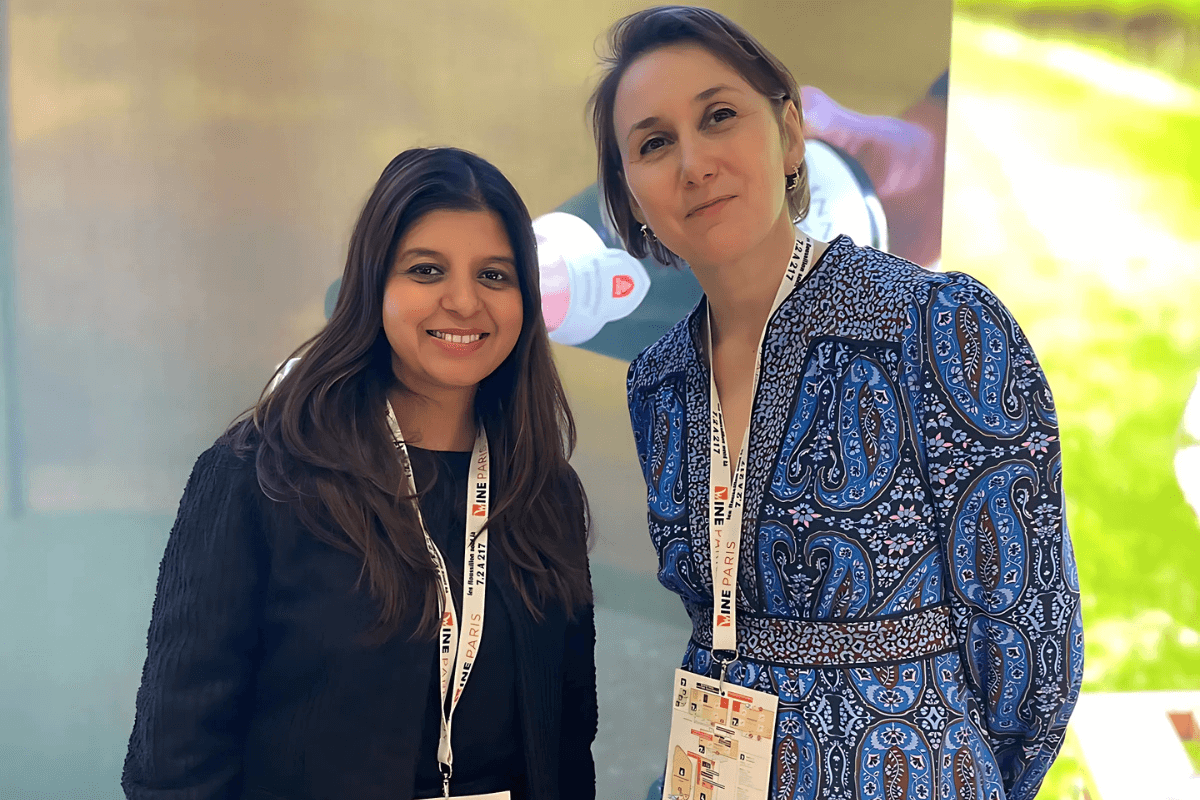
Image: Malvika Patel with Nicola Bates at VinExpo 2025.
Malvika: This is still a new area, right? It's something you need to chart out, a new and focused export strategy for the British wine industry.
Nicola: Absolutely. And yes, this is our first time at VinExpo. You can see the glasses keep going off. It's quite busy.
We had an exceptionally good stand at Prowein last year. We had 12 producers. I think that we wanted to trial Prowein and Paris this year and we should get into the position where we make a choice. There seems to be a bit of back and forth about where Prowein is going and we just need to make sure that we are positioning our members in the best possible place for them.
With still wines—particularly Chardonnay and reds—gaining traction, how is Wines of GB adjusting its marketing approach to reflect this diversification? Are there specific markets where these styles are proving particularly successful?
Nicola: So yes you're right there are two different styles, well there are lots of different styles which you have. But our stills are superb and they're getting there and it's part of our conversation. From an export perspective, still, the vast majority of the conversation and the wines being sold are sparkling. They are completely charged and then you have the stills that come up and behind. One of the things we also wanted to do was to reflect the positioning of stills and sparkling around the world in terms of the awards people are winning because that's a really good sort of indication of what can have resonance in different countries. So we created something called the Golden 50. It's our list of the 50 wives who scored gold across various awards.
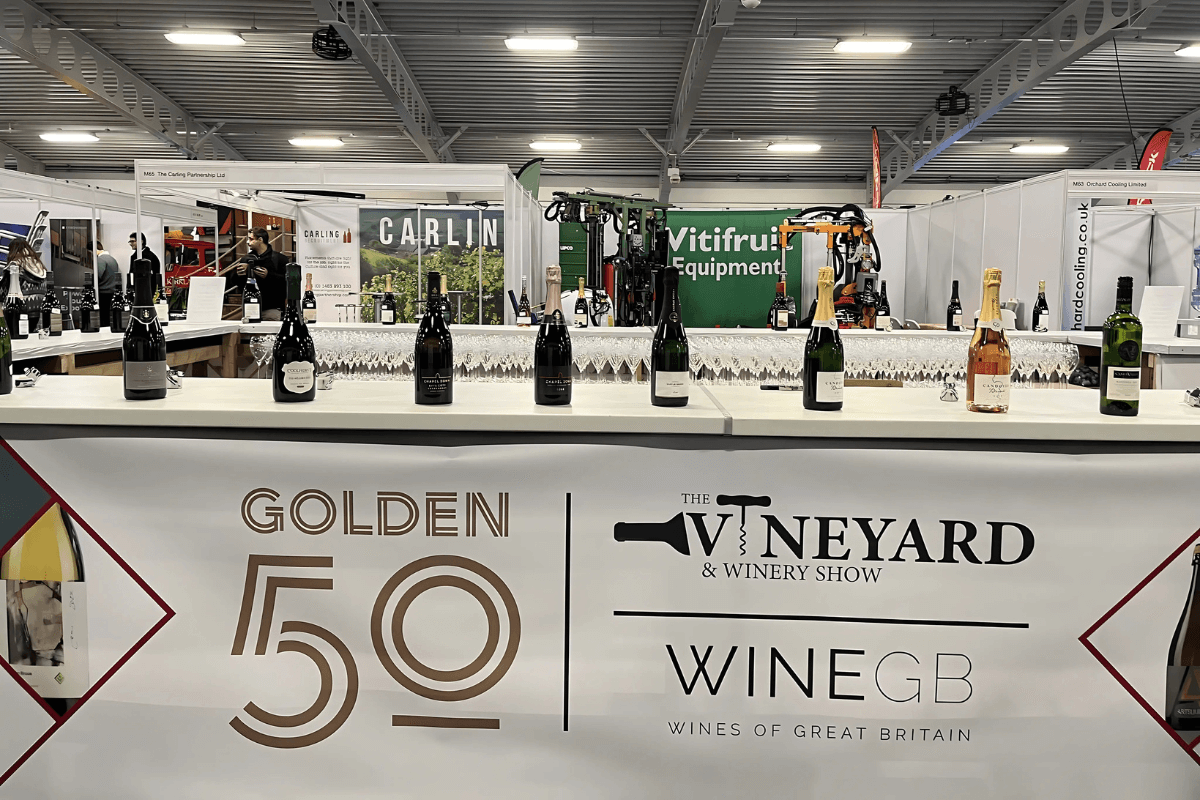
Image: Vineyard & Winery Show – Showcasing Golden 50 award-winning wines alongside this year’s top winners!
Malvika: Which competitions did you cover in that?
Nicola: It was basically all the big ones. We wanted to have a proper catch. We had over 100 wines to be able to choose from these various golden awards. We wanted to be able to showcase the whole country and showcase different styles.
Malvika: That's a good way of putting your best list out there.
Nicola: It also shows you where the interest is and shows you what wines we're going to do.
The report highlights how British wine is reaching a turning point in both volume and reputation. How do you ensure that this growth translates into greater brand recognition internationally?
Nicola: Our responsibility is to make sure that we're providing the crux, which allows that category-wide conversation. We have three major areas of work to talk about each year, and they're our hosts. There are our awards. There is English Wine Week and there’s our Great Tasting. Come and taste the nation in one day. Over which we're adding in the next few months. We're right in the process of refreshing our brand. finding a campaign which captures all members in there and is able to drive forward that conversation. That's coming. And we're able to then go from interest and knowledge. We have some brilliant brands here today. But it then creates more of a unified voice in amongst what we're trying to show. Showcasing the style of wines, the terroir, talking about our sustainability and making sure we're pulling out the aspects that matter most for buyers today. and then reinforcing that time and time again.
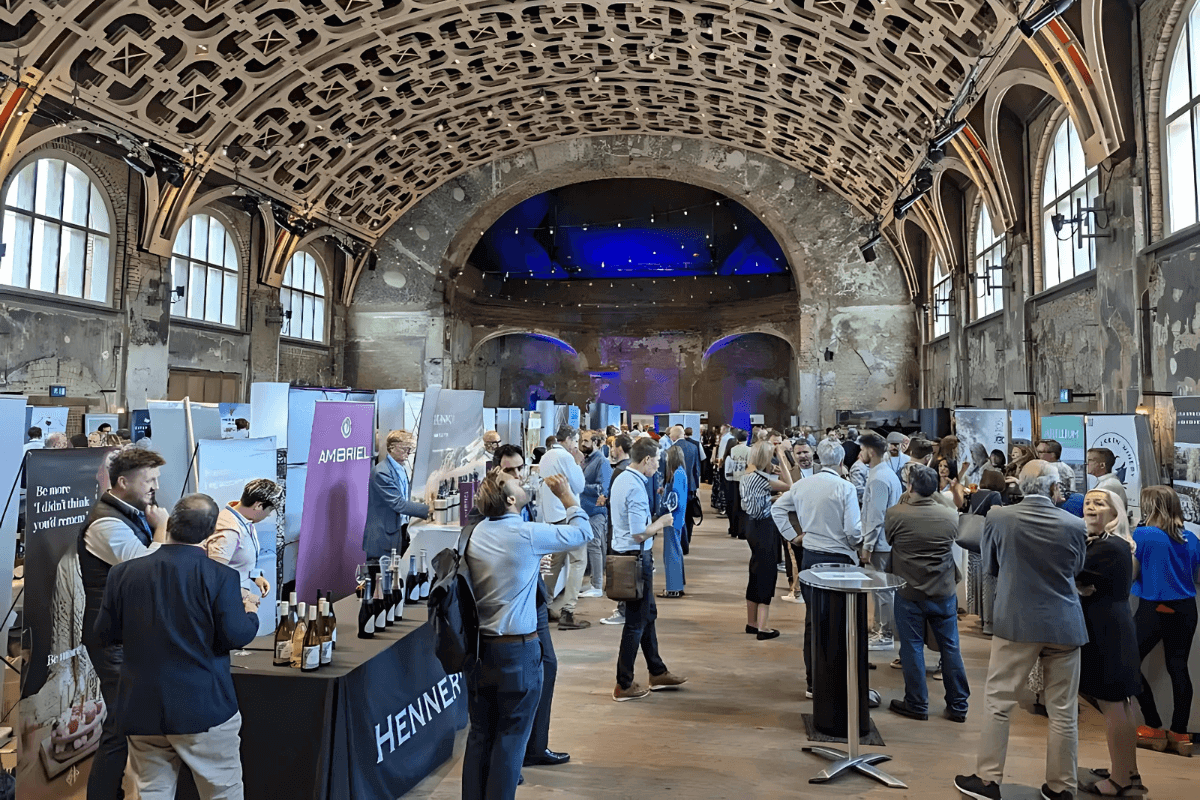
Image: WineGB's 2024 annual tasting.
Sustainability is increasingly important to both producers and consumers. Given the climate insights from the harvest report, how is Wines of GB supporting members in balancing growth with sustainability commitments?
Nicola: The industry has grown up with the changing climate and so from the outset, they've had to ensure that production is able to adapt to that. It gives us strength but also we're conscious of what that means. So there are two ways in which we're doing it. One is we have something called the Sustainable Wines of Great Britain Certification Programme. It's an independently audited programme that wineries and vineyards go through, they look at how they reduce their carbon, and they look to demonstrate their sustainability.
[[relatedPurchasesItems-38]]
Malvika: And do you have any targets?
Nicola: What we're doing is we're going to develop that as time goes by, but we're getting each vineyard and each winery to look at that and show a change within their own space that will then follow through. System Bolaget, for instance, uses this as its criteria for English wines to make their list.
So that's one side of things and we're increasing visibility of people within that, we will be increasing visibility of people within that going forward and also making sure that retailers understand what that logo means and we give that sort of precedent. The other side is to help our industry as a whole to be more sustainable. That certification is great, it's really powerful, but we've introduced a free carbon calculator for everyone. I have to go into the scheme to do that so they're able to measure their carbon, they're able to track that change.
It points to one of the three things that we're here to do as an association. I'll follow through on the second side in a minute. We are here to provide knowledge and expertise for our members so they're able to support production and build people within their space. And sort of build the environment to bring the best people in. We are there to enhance the reputation of the sector, making sure that the government understands our value, is able to appreciate what we provide, and we're able to then speak as a collective voice to ensure that the policy rectifying works best for us. And then third is the sales and marketing piece. How do we demonstrate the quality of our sector? And that's fundamental and key, and that's why we're here today at WineParis.
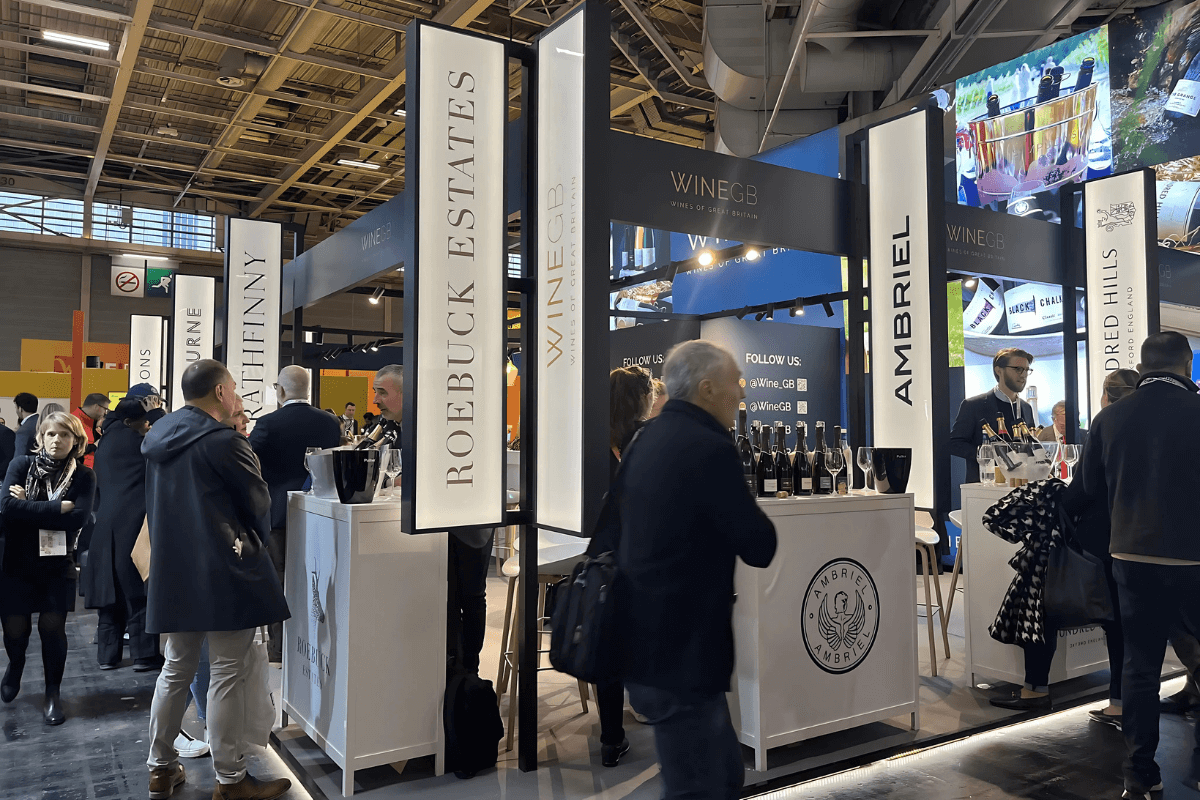
Image: Wines of Great Britain at Wine Paris 2025.
When it comes to sustainability, sustainability is very much in the production of people's lives and how do we make the most of it, that's where it mainly lives. So we spoke on one side about how we tell that story to the consumer, with the Sustainable Wines of Great Britain Certification Programme and helping people to understand what they can do in the vineyard, but also for those people not seeking that accreditation straight away, because there is a cost to it because it's audited, we are providing lots of free resources so people are able to make enhancements, make changes. So in a few years time, they've all carried out various toolkits. It's very easy for them just to go and do the SWGB and we're providing them a path to get there.
Conclusion
The British wine industry is no longer a curiosity—it’s gaining ground on the global stage. The record-breaking 2023 harvest underscores its ability to scale, but as Nicola Bates emphasises, growth alone isn’t enough. Building an export strategy that ensures British wine stays in demand, championing still wines alongside sparkling, and embedding sustainability into the industry’s DNA are all key to shaping the next decade.
With WineGB taking the lead in global promotion, industry-wide certification programs, and long-term market positioning, British wine is on the cusp of something bigger. It’s not just about making great wine; it’s about making sure the world recognizes it.
In conversation with Malvika Patel, Editor and VP, Beverage Trade Network
Also Read:
WineGB’s Roadmap: Cultivating Success Under Nicola Bates
Championing Change: Queena Wong’s Impact on the Wine Industry
Balkan Bottles in Britain: Nikola Salipur on Wine, Passion, and Possibility.

